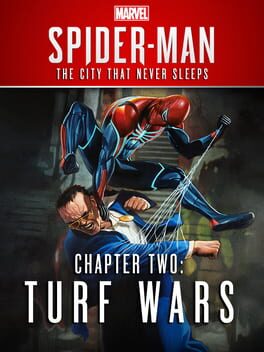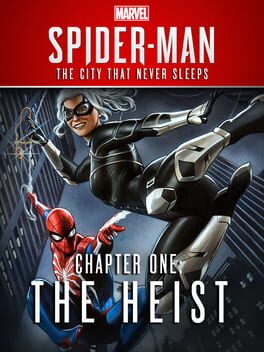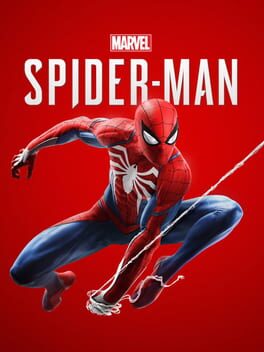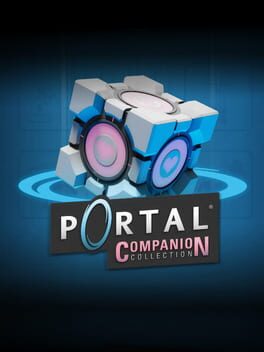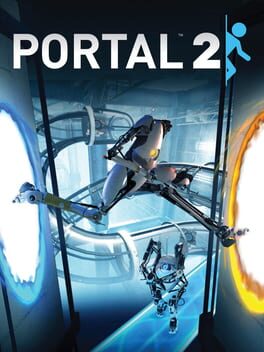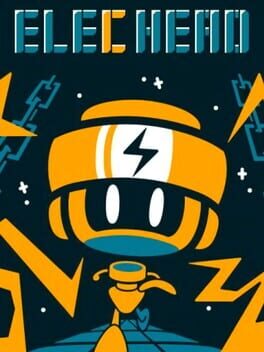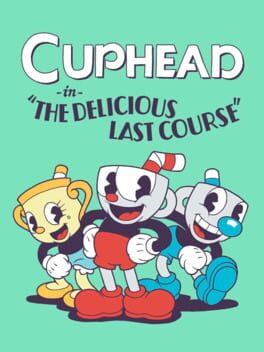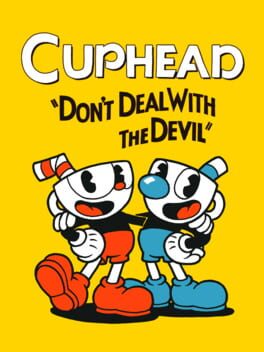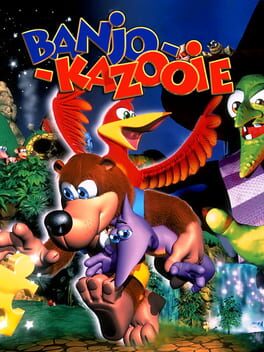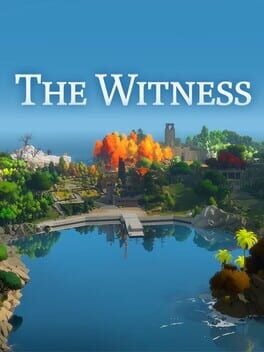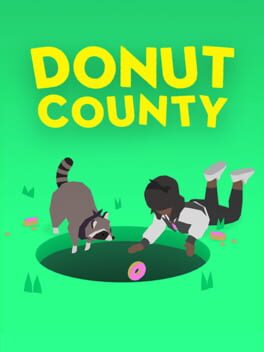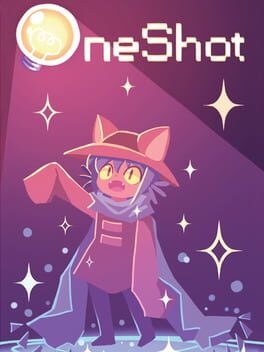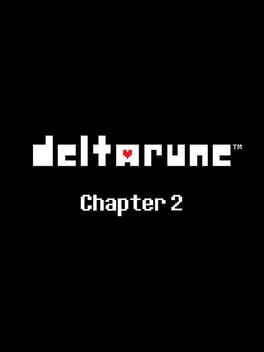ampiere
Still not thrilled by this DLC.
I originally praised this game for its mindlessly fun combat, but the selection of missions here slowly turned it mind numbingly rote. After the third police escort mission, I almost turned the game off. At least some of the Screwball challenges were interesting mixups to the usual combat.
The DLC's tendency for touch-and-go storytelling left plot threads like Yuri's true motives and Hammerhead's grudge against Spider-Man painfully uninteresting. I understand that the episodic structure lends itself to revealing everything at the end, but is there really much intrigue to begin with? I'd love to be proven wrong.
And seriously, mafia thugs using burrowing tanks to get around?
I originally praised this game for its mindlessly fun combat, but the selection of missions here slowly turned it mind numbingly rote. After the third police escort mission, I almost turned the game off. At least some of the Screwball challenges were interesting mixups to the usual combat.
The DLC's tendency for touch-and-go storytelling left plot threads like Yuri's true motives and Hammerhead's grudge against Spider-Man painfully uninteresting. I understand that the episodic structure lends itself to revealing everything at the end, but is there really much intrigue to begin with? I'd love to be proven wrong.
And seriously, mafia thugs using burrowing tanks to get around?
Meh.
Even as DLC, The Heist doesn't swing in with enough grandeur to kick off a three-part side story. The intrigue of rising gang wars is largely uninteresting, and the story beats with Black Cat pull the rug too often to ever find a solid narrative. Since these chapters are partitioned off from the main campaign, it never quite feels like you're following one of the many threads woven into this city. Of course, this also makes achieving 100% completion that much more unwieldy.
A few remixes to the gameplay are also tossed in here, but none of them rise above what's offered in the base game. Still, beating up baddies is always a good time when you're Spider-Man.
Even as DLC, The Heist doesn't swing in with enough grandeur to kick off a three-part side story. The intrigue of rising gang wars is largely uninteresting, and the story beats with Black Cat pull the rug too often to ever find a solid narrative. Since these chapters are partitioned off from the main campaign, it never quite feels like you're following one of the many threads woven into this city. Of course, this also makes achieving 100% completion that much more unwieldy.
A few remixes to the gameplay are also tossed in here, but none of them rise above what's offered in the base game. Still, beating up baddies is always a good time when you're Spider-Man.
2018
Marvel's Spider-Man is a fun romp packed with so much content, it occasionally stumbles over itself.
With so much to do, I was never having a bad time (except for a few bugs leading to mismatched dialogue, softlocked missions, and even crashing the game once). The constantly rotating gallery of villains allows for change-ups in gameplay and narratives, and nothing gets too stale. There's nothing jaw-dropping here narratively speaking, though its original story still hits the mark with its characters and stays true to the essence of Spider-Man. Combat didn't click with me for a while (and I'll chalk that one up to my smooth brain), but by the end I was webbing up baddies with true mastery. Swinging through the suburban sprawl felt so fun that I rarely opted for fast-travel instead.
Marvel's Spider-Man brings it all to the table: gadgets, combat, side missions, collectibles, and much more. It lays it on pretty thick at the start, and only continues to pile on the content up until the very end. I ignored the factions for the majority of the game, and there was a sizable chunk of the Spider-Man's armory that I never found a practical use for. It makes perfect sense that The City That Never Sleeps has a never-ending list of chores. In my case, the incessant content led to a mid-game analysis paralysis and arguably the nadir of my playthrough.
"Too much content" shouldn't be a very harsh critique. The main storyline is compelling on its own, flourished with quippy humor, fun change-ups, and some excellent fight sequences.
also QTEs will never not suck
With so much to do, I was never having a bad time (except for a few bugs leading to mismatched dialogue, softlocked missions, and even crashing the game once). The constantly rotating gallery of villains allows for change-ups in gameplay and narratives, and nothing gets too stale. There's nothing jaw-dropping here narratively speaking, though its original story still hits the mark with its characters and stays true to the essence of Spider-Man. Combat didn't click with me for a while (and I'll chalk that one up to my smooth brain), but by the end I was webbing up baddies with true mastery. Swinging through the suburban sprawl felt so fun that I rarely opted for fast-travel instead.
Marvel's Spider-Man brings it all to the table: gadgets, combat, side missions, collectibles, and much more. It lays it on pretty thick at the start, and only continues to pile on the content up until the very end. I ignored the factions for the majority of the game, and there was a sizable chunk of the Spider-Man's armory that I never found a practical use for. It makes perfect sense that The City That Never Sleeps has a never-ending list of chores. In my case, the incessant content led to a mid-game analysis paralysis and arguably the nadir of my playthrough.
"Too much content" shouldn't be a very harsh critique. The main storyline is compelling on its own, flourished with quippy humor, fun change-ups, and some excellent fight sequences.
also QTEs will never not suck
Two great games in a convenient package! The original Portal is 15 years old, and its age does tend to show here. While it's still fun and inventive in its own right, I admittedly wasn't swept away after its handful of hours in gameplay. That said, I highly recommend playing the original to fully enjoy the sequel. I've already sung praises about Portal 2 in another review, but it's worth reiterating what a great game it is. The Companion Collection is the perfect way for both Portal newcomers and veterans to dive into these games.
2011
An excellent game and incredible sequel. Not only is Portal 2 a blast to play, it's also particularly adept at making you feel way in over your head, being a small cog in an impossibly large machine.
As a follow-up to Portal, this game does everything and does it better. Portal 2 takes a deep dive into its story, navigating you through time capsules of Aperture's rise and fall. Its humor had me laughing out loud, even if I've heard these jokes dozens of times before. I've admittedly memorized Cave Johnson's rant about lemons word for word, a consequence of being a teenager during my first playthrough. Even so, I was still roaring with laughter throughout his unhinged monologue. While the quipping might have made my eyes roll in other contexts (see: any Marvel movie), they never came at the expense of its narrative. Portal 2 nails its storytelling, making you feel like a fragile test subject bumbling their way through increasingly dire straits.
And ultimately, Portal 2 is fun. Really fun. It's just so satisfying to shoot a gun that makes portals. While it starts off with more traditional puzzles a la Portal 1, new mechanics are mixed in, gradually shifting to more environmental puzzles, and finally deconstructing its own test chamber mechanic by the end.
There's so much more I could say about Portal 2. Its sound design effortlessly weaves together its environment and gameplay. The multiplayer mode reigned supreme as the go-to couch co-op game (that is, until It Takes Two usurped the throne). The level editor is surprisingly robust and stole many hours from my summers a decade ago. And of course, that ending still kicks ass.
As a follow-up to Portal, this game does everything and does it better. Portal 2 takes a deep dive into its story, navigating you through time capsules of Aperture's rise and fall. Its humor had me laughing out loud, even if I've heard these jokes dozens of times before. I've admittedly memorized Cave Johnson's rant about lemons word for word, a consequence of being a teenager during my first playthrough. Even so, I was still roaring with laughter throughout his unhinged monologue. While the quipping might have made my eyes roll in other contexts (see: any Marvel movie), they never came at the expense of its narrative. Portal 2 nails its storytelling, making you feel like a fragile test subject bumbling their way through increasingly dire straits.
And ultimately, Portal 2 is fun. Really fun. It's just so satisfying to shoot a gun that makes portals. While it starts off with more traditional puzzles a la Portal 1, new mechanics are mixed in, gradually shifting to more environmental puzzles, and finally deconstructing its own test chamber mechanic by the end.
There's so much more I could say about Portal 2. Its sound design effortlessly weaves together its environment and gameplay. The multiplayer mode reigned supreme as the go-to couch co-op game (that is, until It Takes Two usurped the throne). The level editor is surprisingly robust and stole many hours from my summers a decade ago. And of course, that ending still kicks ass.
2021
The Delicious Last Course is exactly what I hoped it would be: more Cuphead shenanigans.
While it might be "too-little-too-late", I can't complain too much at its price point. The new bosses are silly, fun to fight, and have that great soundtrack to back it up. Ms. Chalice is a welcome switch-up to the gameplay, and actually helped me eke out a victory in some tougher fights. I was already looking for an excuse to replay the base game, so playing as Ms. Chalice to beat the original bosses for 100% completion was undoubtedly a welcome diversion.
That said, I did encounter a few visual and technical glitches in the DLC. Albeit infrequent, they often led to reseting the game (or sometimes just crashing). And again, I wish there was just a little more meat on these bones, but I'm absolutely satisfied with the complete package.
While it might be "too-little-too-late", I can't complain too much at its price point. The new bosses are silly, fun to fight, and have that great soundtrack to back it up. Ms. Chalice is a welcome switch-up to the gameplay, and actually helped me eke out a victory in some tougher fights. I was already looking for an excuse to replay the base game, so playing as Ms. Chalice to beat the original bosses for 100% completion was undoubtedly a welcome diversion.
That said, I did encounter a few visual and technical glitches in the DLC. Albeit infrequent, they often led to reseting the game (or sometimes just crashing). And again, I wish there was just a little more meat on these bones, but I'm absolutely satisfied with the complete package.
2017
While I beat Cuphead a few years ago, I'm jotting down my review for it since I had the pleasure of returning to it after its DLC released.
Cuphead requires some thick skin and quick reflexes, but beating its buffet of bite-sized battles is absolutely worth it. I vividly remember grinding out some of the toughest bosses, controller melting in hand, and jumping up from my couch when I knocked out some of the toughest foes.
I also remember tirelessly playing through Cuphead while my girlfriend (who studies film and animation) watched beside me, in awe of its visual style. The soundtrack is also incredible, and it got me through writing most of my master's thesis last year.
And even though there's nothing left to complete, I'll still boot it up just to replay some of my favorite levels and hear my favorite tunes.
Cuphead requires some thick skin and quick reflexes, but beating its buffet of bite-sized battles is absolutely worth it. I vividly remember grinding out some of the toughest bosses, controller melting in hand, and jumping up from my couch when I knocked out some of the toughest foes.
I also remember tirelessly playing through Cuphead while my girlfriend (who studies film and animation) watched beside me, in awe of its visual style. The soundtrack is also incredible, and it got me through writing most of my master's thesis last year.
And even though there's nothing left to complete, I'll still boot it up just to replay some of my favorite levels and hear my favorite tunes.
2020
This review contains spoilers
(Spoiler warning just in case)
An experience that's wholly unique and yet proudly wears its influences on its sleeve. Omori is hilarious, touching, upsetting, and unsettling.
When media deal with heavy themes like mental illness, suicide, trauma, and the likes, it's always hard to give my full recommendation (see the anime Monster). But it's not despite of, but rather because of how these themes are woven into the story that it earns my recommendation.
If the list of favorite games on my profile didn't give it away, Omori should be right up my alley. And for the most part, it is! I actually went in to this game completely blind, so I had no idea about the story or gameplay. The art style is instantly alluring, the soundtrack (with Slime Girls!!!) is groovy, and the writing breathes life into the characters and their worlds. I genuinely felt remorse when characters were at their nadir of their suffering, and a wave of relief once I reached the good ending (unintentionally).
That said, I think my biggest issue with the game is the pacing. I was never really sure how much of the game I had left, even up to the very end. I also understand there are multiple paths and endings to the game, and while conceptually that sounds interesting, I'm not sure I want to muscle through another 20 hours or so to see that content. The combat itself didn't feel as deep as it seemed to lead on, as I found a method that worked from the beginning and stuck with it for the rest of the game.
I wouldn't let my few criticisms detract from my overall positive experience with the game. Omori is nothing short of great, and I have the feeling I'll return to it years later.
(also they did NOT have to go as hard as they did on sweetheart's theme but here we are)
An experience that's wholly unique and yet proudly wears its influences on its sleeve. Omori is hilarious, touching, upsetting, and unsettling.
When media deal with heavy themes like mental illness, suicide, trauma, and the likes, it's always hard to give my full recommendation (see the anime Monster). But it's not despite of, but rather because of how these themes are woven into the story that it earns my recommendation.
If the list of favorite games on my profile didn't give it away, Omori should be right up my alley. And for the most part, it is! I actually went in to this game completely blind, so I had no idea about the story or gameplay. The art style is instantly alluring, the soundtrack (with Slime Girls!!!) is groovy, and the writing breathes life into the characters and their worlds. I genuinely felt remorse when characters were at their nadir of their suffering, and a wave of relief once I reached the good ending (unintentionally).
That said, I think my biggest issue with the game is the pacing. I was never really sure how much of the game I had left, even up to the very end. I also understand there are multiple paths and endings to the game, and while conceptually that sounds interesting, I'm not sure I want to muscle through another 20 hours or so to see that content. The combat itself didn't feel as deep as it seemed to lead on, as I found a method that worked from the beginning and stuck with it for the rest of the game.
I wouldn't let my few criticisms detract from my overall positive experience with the game. Omori is nothing short of great, and I have the feeling I'll return to it years later.
(also they did NOT have to go as hard as they did on sweetheart's theme but here we are)
1998
I have no nostalgia for this game, and I don't think it aged all that well.
I got through the first three worlds and realized I just wasn't enjoying it. Even after making some decent progress, I still had some trouble handling the controls (with no help from NSO's garbage button-mapping). Wrangling those clunky controls only exacerbates the pains of a collect-a-thon, with having to navigate every corner of a map and painstakingly find every item.
I really wish I had a better experience with this.
I got through the first three worlds and realized I just wasn't enjoying it. Even after making some decent progress, I still had some trouble handling the controls (with no help from NSO's garbage button-mapping). Wrangling those clunky controls only exacerbates the pains of a collect-a-thon, with having to navigate every corner of a map and painstakingly find every item.
I really wish I had a better experience with this.
2016
This review contains spoilers
An amazingly introspective gaming experience.
While I'm sure The Witness can be interpreted in any number of ways, what especially resonated with me is the idea of perspective. "We shape clay into a pot, but it is the emptiness inside that holds whatever we want." Is the player lost on this island? Is the goal to solve as many puzzle panels it takes to beat the game? Or is it the ambling and exploration that gives this journey its meaning?
On the surface, The Witness is simply a series of puzzles on panels. These puzzles alone could've easily been a mobile game that you'd finish in an afternoon, but its island setting allows the game to take these puzzles to impressive lengths. I was initially frustrated at the game's lack of explicit direction, and even considered abandoning the game at one point (seriously, I don't think I would've ever figured out what the asterisk symbol meant on my own.) It was the epiphany of finding the way forward that hooked me, making me scour the island for more puzzles to put what I just learned to the test.
For such a simple concept, the complexities grew deeper and deeper. Puzzles often started as tutorials, only to pull the rug out at the last step. Now there's a branch in the way of the puzzle. There's a lone panel out in the desert. You're in a garden maze with seemingly no exit. It wasn't until I changed my perspective in those situations that I could see the solution.
Soon my eyes were tuned to find these puzzles anywhere – and they were everywhere. From the tower, I could see a circle on a dirt road. On the boat was a circle. The sun above me, an omnipresent circle. While finding these puzzles was often happenstance, the real puzzle was finding the right perspective in the situation.
The Witness can be obtuse and aimless at times, but it almost feels meditative in a way. I suppose this is the longest review I've written, but the game warrants this kind of discussion. I highly recommend it.
While I'm sure The Witness can be interpreted in any number of ways, what especially resonated with me is the idea of perspective. "We shape clay into a pot, but it is the emptiness inside that holds whatever we want." Is the player lost on this island? Is the goal to solve as many puzzle panels it takes to beat the game? Or is it the ambling and exploration that gives this journey its meaning?
On the surface, The Witness is simply a series of puzzles on panels. These puzzles alone could've easily been a mobile game that you'd finish in an afternoon, but its island setting allows the game to take these puzzles to impressive lengths. I was initially frustrated at the game's lack of explicit direction, and even considered abandoning the game at one point (seriously, I don't think I would've ever figured out what the asterisk symbol meant on my own.) It was the epiphany of finding the way forward that hooked me, making me scour the island for more puzzles to put what I just learned to the test.
For such a simple concept, the complexities grew deeper and deeper. Puzzles often started as tutorials, only to pull the rug out at the last step. Now there's a branch in the way of the puzzle. There's a lone panel out in the desert. You're in a garden maze with seemingly no exit. It wasn't until I changed my perspective in those situations that I could see the solution.
Soon my eyes were tuned to find these puzzles anywhere – and they were everywhere. From the tower, I could see a circle on a dirt road. On the boat was a circle. The sun above me, an omnipresent circle. While finding these puzzles was often happenstance, the real puzzle was finding the right perspective in the situation.
The Witness can be obtuse and aimless at times, but it almost feels meditative in a way. I suppose this is the longest review I've written, but the game warrants this kind of discussion. I highly recommend it.
2018
On the (w)hole it's a pleasant turn-your-brain-off experience, but its gameplay never really dug deep enough and was already over before anything could sink in.
It's got a nice visual design and soundtrack, and at its best reminded me of the Katamari series. Despite its own description, I wouldn't say this is a "puzzle" game in that you have to really think about what you're doing. "Story-driven" is a stretch too, and the character dialogue often interrupted the flow of gameplay. I wish levels were a little longer and had more open spaces to let the player goof around and wreak a little more havoc.
It's got a nice visual design and soundtrack, and at its best reminded me of the Katamari series. Despite its own description, I wouldn't say this is a "puzzle" game in that you have to really think about what you're doing. "Story-driven" is a stretch too, and the character dialogue often interrupted the flow of gameplay. I wish levels were a little longer and had more open spaces to let the player goof around and wreak a little more havoc.
2016
This review contains spoilers
spoilers just in case
OneShot is, if nothing else, cute and creative. Its premise of the player having "one shot" to play to the ending meshes well with the game's themes of consequence and finality. Breaking the fourth wall not only led to some clever puzzles to solve, but helped create an overall interesting metanarrative.
That said, the Solstice ending uprooted almost everything I enjoyed about the first playthrough. It was no doubt a shock when I realized I could keep playing, but I almost wish I didn't. Sure, it helps explain the unresolved mysteries of the first playthrough, but dialogue became overly complex and didn't serve its original premise well.
OneShot is, if nothing else, cute and creative. Its premise of the player having "one shot" to play to the ending meshes well with the game's themes of consequence and finality. Breaking the fourth wall not only led to some clever puzzles to solve, but helped create an overall interesting metanarrative.
That said, the Solstice ending uprooted almost everything I enjoyed about the first playthrough. It was no doubt a shock when I realized I could keep playing, but I almost wish I didn't. Sure, it helps explain the unresolved mysteries of the first playthrough, but dialogue became overly complex and didn't serve its original premise well.
2021
Okay, this game rocks. The writing's great as always, the music's great, the fights are great. It feels a little weird that a few elements from Chapter 1 were rewritten, but other elements return in surprising and fun ways. Overall, Chapter 2 is a direct improvement in practically every way. It's just a fun, well-written, bite-sized experience that I've played through three times already.
